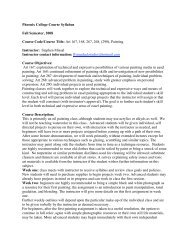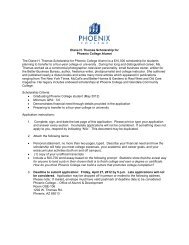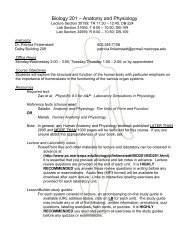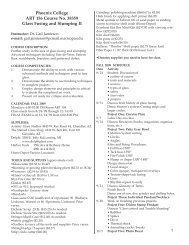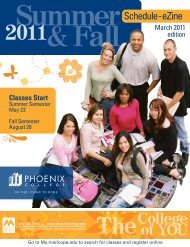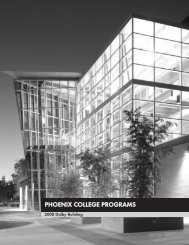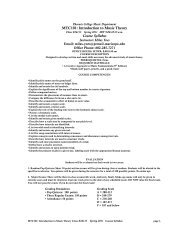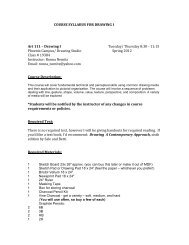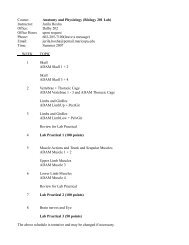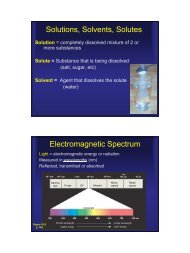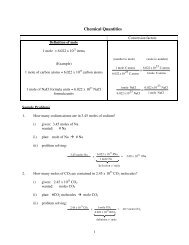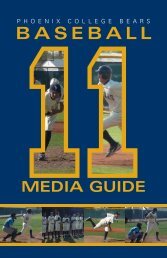Phoenix College Catalog 2009-10
Phoenix College Catalog 2009-10
Phoenix College Catalog 2009-10
You also want an ePaper? Increase the reach of your titles
YUMPU automatically turns print PDFs into web optimized ePapers that Google loves.
204 | <strong>Phoenix</strong> <strong>College</strong> <strong>2009</strong>–20<strong>10</strong> CATALOG + = Course requires a Pre-Corequisite ++ = Any module<br />
Service Occupations<br />
IPP208 . . . . . . . . . .Advanced American Sign Language Discourse +. ..4<br />
IPP229 . . . . . . . . . .Interpreter Preparation Internship<br />
Seminar + (1) AND<br />
IPP230AA . . . . . . .Interpreter Preparation Program<br />
Internship + (1) OR<br />
IPP230AB . . . . . . .Interpreter Preparation Program<br />
Internship + (2) OR<br />
IPP230AC. . . . . . . .Interpreter Preparation Program<br />
Internship + (3) OR<br />
IPP230AD . . . . . . .Interpreter Preparation Program<br />
Internship + (4) ....................... 2-5<br />
IPP250AA. . . . . . . .Special Topics: Interpreter Preparation (1) OR<br />
IPP250AC. . . . . . . .Special Topics: Interpreter Preparation (3) . . 1-3<br />
PSY<strong>10</strong>1. . . . . . . . . .Introduction to Psychology ................3<br />
SOC<strong>10</strong>1 . . . . . . . . .Introduction to Sociology .................3<br />
Free Electives: None.<br />
General Education: None.<br />
Please Note: The Interpreter Preparation certificate requires a G.P.A.<br />
of 2.5.<br />
SERVICE OCCUPATIONS — Military<br />
Science<br />
Contact: Ms. C. Kakar (602) 285-7732<br />
Reserve Officers Training Corps<br />
(ROTC) — Aerospace Studies/Military<br />
Science<br />
Through an arrangement with Arizona State University at Tempe,<br />
students at <strong>Phoenix</strong> <strong>College</strong> can take freshman and sophomore year<br />
classes in ROTC. Students register for the classes at <strong>Phoenix</strong> <strong>College</strong><br />
and take the courses at Arizona State University. The goal of the<br />
ROTC classes is to provide a foundation of military knowledge and<br />
skills needed by junior officers in the military. Students may take<br />
ROTC credit in (Army) Military Science or (Air Force) Aerospace<br />
Studies. For further information, see below or contact Army ROTC at<br />
(480) 965-3318 or Air Force ROTC at (480) 965-3181.<br />
AEROSPACE (AIR FORCE)<br />
Purpose: The Department of Aerospace Studies curriculum consists<br />
of the general military course and history for freshmen and<br />
sophomores (AES <strong>10</strong>1, <strong>10</strong>2, 201, 202) and the Professional Officer<br />
Course for juniors and seniors (AES 301, 302, 401, 402).<br />
General Qualifications: A man or woman entering Air Force<br />
Reserve Officer Training Corps (AFROTC) must be the following: (1)<br />
a citizen of the United States (noncitizens may enroll, but must obtain<br />
citizenship before commissioning); (2) of sound physical condition;<br />
and (3) at least 17 years of age for scholarship appointment or<br />
admittance to the Professional Officer Course (POC). Additionally,<br />
scholarship recipients must be able to fulfill commissioning<br />
requirements by age 25. If designated for flying training, the student<br />
must be able to complete all commissioning requirements prior to<br />
age 26 and a half; other categories must be able to complete all<br />
commissioning requirements before age 30.<br />
Four-Year Program (GMC and POC). A formal application is not<br />
required for students entering the four-year program. A student may<br />
enter the program by simply registering for one of the general military<br />
course (GMC) classes at the same time and in the same manner as<br />
other courses. GMC students receive two semester hours of credit<br />
for each AES <strong>10</strong>0 and 200 class completed a total of eight semester<br />
hours. GMC students not on AFROTC scholarship incur no military<br />
obligation. Each candidate for commissioning must pass an Air Force<br />
aptitude test and a physical examination and be selected by a board<br />
of Air Force officers. If selected, the student then enrolls in the POC<br />
the last two years of the Air Force ROTC curriculum. Students attend<br />
a four-week field training course at an Air Force base normally<br />
between the sophomore and junior year. Upon successful completion<br />
of the POC and the college requirements for a degree, the student is<br />
commissioned in the U.S. Air Force as a second lieutenant. The new<br />
officer then enters active duty or may be granted an educational<br />
delay to pursue graduate work.<br />
Two-Year Program (POC). The basic requirement for entry into the<br />
two-year program is that the student have two academic years of<br />
college work remaining, either at the undergraduate or graduate<br />
level. Applicants seeking enrollment in the two-year program must<br />
pass an Air Force aptitude and medical examination and be selected<br />
by a board of Air Force officers. After successfully completing a sixweek<br />
field training course at an Air Force base, the applicant may<br />
enroll in the professional officer course in the AFROTC program.<br />
Upon completion of the POC and the college requirements for a<br />
degree, the student is commissioned.<br />
Qualifications for Admittance to the Professional Officer Course<br />
(POC). (1) The four-year student must successfully complete the<br />
general military course and the four-week field training course. (2)<br />
The two-year applicant must complete a six-week field training<br />
course. (3) All students must pass the Air Force Officer Qualifying<br />
Test (AFOQT). (4) All students must pass the Air Force physical<br />
examination. (5) All students must maintain the minimum GPA<br />
required by the college.<br />
Pay and Allowances. POC members in their junior and senior years<br />
receive $200 per month for a maximum of 20 months of POC<br />
attendance. Students are also paid to attend field training. In addition,<br />
uniforms, housing, and meals are provided during field training at no<br />
cost to the student. Students are reimbursed for travel to and from<br />
field training.<br />
Scholarships. AFROTC offers scholarships annually to outstanding<br />
young men and women on a nationwide competitive basis.<br />
Scholarships cover full college tuition for resident and non-resident<br />
students and provide an allowance for books, fees, supplies, and<br />
equipment, and a monthly tax-free allowance of $200. Scholarships<br />
are available on a four-, three, and two-year basis. To qualify for the<br />
four-year scholarship, a student must be a U.S. citizen and submit an<br />
application before December 1 of the senior year in high school.<br />
Interested students should consult their high school counselors or<br />
call AFROTC at ASU for application forms to be submitted to: HQ.<br />
AFROTC, Maxwell AFB, Alabama 36112-6633. Male and female<br />
students enrolled in AFROTC at ASU are eligible for three- and twoyear<br />
scholarships. Those students interested must apply through the<br />
Department of Aerospace Studies. Consideration is given to academic<br />
grades, the score achieved on the AFOQT, and physical fitness. A<br />
board of officers considers an applicant’s personality, character and<br />
leadership potential.<br />
Flight Screening Program (FSP). A cadet designated to enter U.S.<br />
Air Force Undergraduate Pilot Training after graduation participates in<br />
FSP after the junior year in college. This program trains and motivates<br />
pilot candidates.<br />
MILITARY SCIENCE (ARMY)<br />
Purpose: The Department of Military Science, or Army ROTC<br />
(Reserve Officers’ Training Corps), is a four-year or two-year program<br />
that consists of the basic and the advanced courses. It is one of the<br />
best leadership courses in the country and is part of a student’s<br />
college curriculum. The curriculum prepares students with the tools,<br />
training, and experiences that will help them succeed in any<br />
competitive environment. During classes and field training, students<br />
learn firsthand what it takes to lead others and motivate groups and<br />
how to conduct missions as an officer in the U.S. Army. Upon



